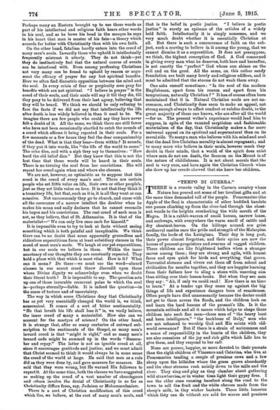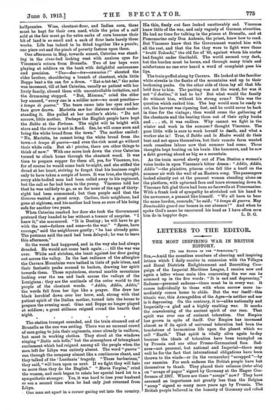"TEMPO DI GUERRA?"
THERE is a remote valley in the Cainaca country where
Nature has poured out some of her loveliest gifts and, at the same time demanded toll of the people. Isom:area:lino (the Apple of the Seal is characteristic of other huddled hamlets one passes climbing up from the river-bed through the chest- nut woods to the heights overlooking the wide mouth, of the Magra. It is a rabbit-warren of small houses:, narrow Lanes, and archways, with everywhere the warm smell of cattle and dry chestnut.leaves. On the hilltops around are grim mediaeval castles once the pride and strength of the Malaspina family, the lords of the Lunigiana. Their day is long past, their power almost forgotten, and their eyries are UDR the homes of peasant-proprietors. and swarms of ragged children. These children are like frightened heifera when. a ataunger moves among them ; they are strong and agile, with. honest faces and eyes quick for birds and everything that grams. Torrential streams and rivers cut them off from school and civilization for months together, and they are happier learning from their fathers how to sling a stone with, unerring aim than sitting over their lesson-books. But when they are. men they say : "Ab, if only we could read.! Now there is no time to learn." At a tender age they come up against the big things of life and experience dangers born of remoteness. Often people have died unnecessarily because the doctor could not get to them across the floods, and the children look on and learn the hard lesson!' of the peasant's lids.. Is it the mountain solitude and. all it means which helps to shape these children into such fine men—those men of "the heavy haat and keen intelligence," "the backbone of Italy," men who are not ashamed to worship Gad and His saints with old- world reverence? But if there is a strain of seriousness and a sense of responsibility in the hearts of the children, they are also conscious of the joy and rich gifts which Life haa, to give them, and they respond to her call.
None are poorer, happier, or more devoted. to their parents than the eight children of Vincenzo and Catarina, who live, at Pomomarina tending a. couple of precious cows and a few sheep upon the hillsides where the. grass grows abundantly and the clear streams rush noisily down to the mills and the river. They sing endplay ac they clamber about gathering wild Strawberries,or in winter time light their gypsy fires. I see the elder ones running barefoot along the road to the town to sell the fruit and the white cheeses made from the sheep's milk, in tiny wicker baskets. These little luxuries which thby can do without are sold for scarce and precious halfpennies. Wine, chestnut-flour. and Indian corn, these must be kept for their own need, while the price of a calf sold at the fair must go for extra sacks of corn because their bit of land is so small and a sack of Hoar lasts barely three weeks. Life has indeed to be fitted together like a puzzle; one piece out and the pinch of poverty fastens upon them.
One afternoon in May, towards sunset, Caterina was stand- ing in the river-bed looking west with anxious eyes for Vino3nzo's return from Brunelle. Two of her boys were playing at soldiers on the bank with delightful seriousness and precision. " Uno—due—tre—cammina !" shouted the elder brother, shouldering a branch of chestnut, while little Beppe beat a tin can for a dram. " Rat-a-tat-tat," the noise was incessant, till at last Catarina, usually so patient with her lively family, abused them with uncontrollable irritation, and the drumming stopped. "But, Mamma," cried the elder boy amazed, "every one is a soldier now—we must practise— e tempo di guerra." The tears came into her eyes and her face grew drawn. Marietta saw her distress without under- standing it. She pulled at her mother's skirts : "Do not sorrow, little mother. Perhaps the English people have kept the Balls at the For/ma. The night will be bright with stars and the river is not in flood. See, he will come soon and bring the white bread from the town." The mother smiled: "Ho, Marietta, he cannot bring the white bread from the town—a, tempo di puce-re—and even the rich must go without their white rolls. But ah ! piceina, there are other things to think of now." With one more look down the river Catarina turned to climb home through the chestnut wood. It was time to prepare supper for them all, yes, for Vincenzo, too, for of course he would come back to-night, and she stifled the dread at her heart, striving to forget that his business ought only to have taken a couple of hours. It was true, she thought, every able-bodied man had been called away to his regiment, but the call so far had been to the young. Vincenzo told her that he was unlikely to go, as so far none of the age of thirty. eight had been summoned; but then people said that the Governo wanted a great army. Carlino, their neighbour, had gone at eighteen, and his mother had been so sure of his being safe for another two yearn.
When Caterina reached her door she took the Government postcard they handed to her without a tremor of surprise. "I knew it," she murmured. "It is Destiny ; he will have to go with the rest—fathers and sons—to the war." "Spam, have courage," said the neighbours gently ; "he has already gone. The postman said the card had been delayed ; he was to leave this afternoon."
So the worst had happened, and in the way she had always dreaded. He would not come back again.., till the war was over. White and stricken, she leant against her door gazing out across the valley. In the last radiance of the afterglow the Carrara 3fonntains were bathed in tints of pale irises, and their fantastic peaks seemed to beckon, drawing her spirit towards them. Those mysterious, eternal marble mountains looking over the sea and back across the valleys of the Lunigiana : they are the sentinels of the outer world to the people of the chestnut woods. " Addio, Addle, Addle,' the words fell from her lips like a prayer. She drew her black kerchief down over her brow, and, strong with that patient spirit of the Italian mother, turned into the house to prepare the evening meal. Gino and Beppe no longer played at soldiers ; a great stillness reigned round the hearth that
night. • • • • • •
The station trumpet sounded, and the train steamed out of Brunelle as the sun was setting. Thera was an unusual crowd of men going to join their regiments, some already in uniform, but most in working clothes. They stood at the windows singing "Italia mia Della," but the atmosphere of triumphant excitement which had reigned among all the people when the men left for Libya was entirely absent. The word " guerra " ran through the company almost like a continuous chant, and they talked of the ' Lusitania' tragedy. "These barbarians," they said," will turn upon us next. If we fight they will bate tal more than they do the English." "Maria Verging," cried the women, and each began to relate her special hard lot to a sympathetic stranger. Yes, it was hard to lose your husband or son a second time when he had only just returned from Libya.
. One man sat apart in a corner gazing out into the country. His thin, finely cut face looked unutterably sad. Vincenzo knew little of the war, and only vaguely of German atrocities. He had no time for talking in the piazza at Brunelle, and at Pomomarino only Don Antonio, the priest, knew how to read. But Vincenzo knew that the Government wanted him with all the rest, and that the foe they were to fight were those " brutti Tedesehi," the old foe of '48, against whom his uncles had fought under Garibaldi The world seemed very dark, but the burden must be borne, and through many trials and misfortunes no one ever heard s word of complaint pass his lips.
The train puffed along by Carrara. He looked at the familiar white streaks in the flanks of the mountains and up to their beckoning peaks. On the other side of them lay all that life held dear to him. The parting was not the worst, for was it not "17 destine," it had to be ? But what would the family do without him, without his strong arms P This was the question which racked him. The hay would soon be ready to cut, the harvest was ripening fast, and he could never be back in time for the vintage ; then would come the gathering of the chestnuta and the beating them out of their spiky husks and, . . oh, it was endless. Why cannot we fight in the winter and work in the summer P thought Vincenzo. The poor little wife is sure to work herself to death, and what a worker she is I True, il Babbo and is Madre would do their best and not spare themselves, but their remote farm wanted such ceaseless labour now that summer had come. These thoughts kept beating on his brain like hammers, and he saw a debt growing ahead as big as a mountain.
As the train moved slowly out of Pisa Station a woman's voice broke in upon Vincenzo'a bitter dream: "Addle, Addles, Addle "—the plaintive, piteous cries fell like a knell on the summer air with the wail of an Eastern song. The passengers looked silently out at the peasant woman standing alone on the platform, with upturned face and tears streaming down it. Vincenzo felt glad there had been no farewells at Pomomarino. With a frank look of sympathy he stretched oat his hand to the newcomer, a peasant like himself. "We all have to bear the same burden, comrade," he said ; "a tempo di guerra. May Domineddie guard our homes in our absence!" And when he spoke God's name he uncovered his head as I have often seen



































 Previous page
Previous page